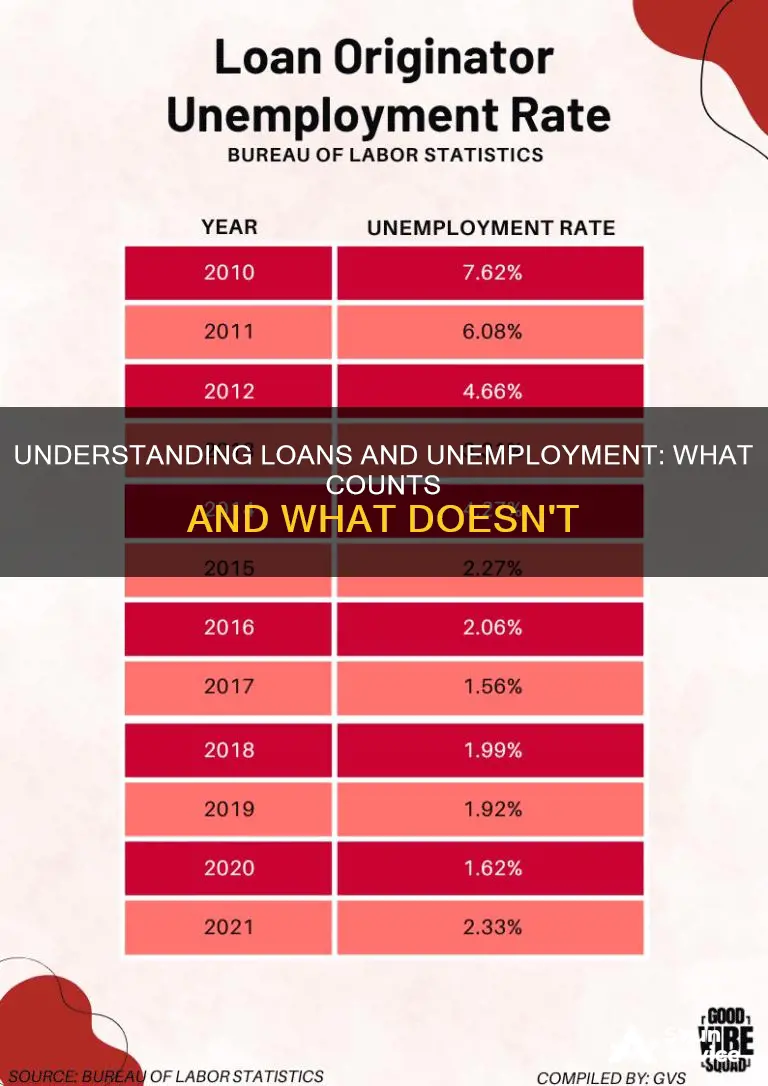
Unemployment benefits can be a lifeline for those who have lost their jobs, but they may also impact an individual's ability to secure a loan. While unemployment benefits do not directly affect an individual's credit score, they typically amount to less than a regular salary, which can make it challenging to keep up with loan payments and consequently impact credit scores. Lenders often require proof of a steady income stream to approve loans, and unemployment benefits are usually offered for a limited time, making it challenging to secure loans with these funds. However, some lenders may consider unemployment benefits as a valid income source, especially for seasonal workers who regularly collect these benefits. Additionally, during the COVID-19 pandemic, eligibility requirements for loans were more relaxed, and recipients of unemployment benefits received an extra $600 per week in assistance.
What You'll Learn
- Lenders may require proof of income, which may include unemployment benefits
- Unemployment benefits can be a lifeline to avoiding late payments and maintaining a healthy credit score
- Unemployment benefits can be considered income for loan applications, but this varies by lender
- PPP loans can be used to pay employees, but they cannot earn UI benefits
- Lenders may require verification documents, such as tax returns and bank statements, to review your ability to repay a loan

Lenders may require proof of income, which may include unemployment benefits
Unemployment benefits can be considered a source of income for loan approval, but it depends on the lender and the type of loan. Some lenders may always or never count unemployment benefits as income. For example, unemployment income generally doesn't count for mortgage pre-approval, as it's only offered for a limited time. However, if you are a seasonal worker with a history of receiving unemployment benefits for several months each year, some lenders may consider it.
Additionally, some loan programs don't require proof of income or employment. There are also non-qualified mortgage (non-QM) programs that allow qualification with documents or assets besides tax returns or pay stubs. These can include asset depletion loans, typically for borrowers with a high net worth, and bank statement loans.
When applying for a loan, it's essential to review the lender's requirements and criteria. Lenders consider a wide range of factors to determine loan terms, and meeting the minimum requirements is necessary for loan approval. It's also important to note that while unemployment won't directly affect your credit score, long-term unemployment can correlate with a deflated credit score.
Loans and Currency: What's the Connection?
You may want to see also

Unemployment benefits can be a lifeline to avoiding late payments and maintaining a healthy credit score
Unemployment benefits can be a financial lifeline for those who have lost their jobs. This income can help meet basic needs and ensure that bills are paid on time, thus helping to maintain a healthy credit score.
When an individual loses their job, they may consider taking out a loan to make ends meet. However, most lenders require proof of a steady source of income to qualify for a loan, which can be challenging if one is unemployed. While unemployment benefits can be considered a form of income, they are often insufficient to qualify for a loan, as they are typically offered for a limited time and may not meet the minimum income requirements set by lenders.
Unemployment benefits can help individuals avoid late payments and maintain their credit score health. Credit bureaus calculate credit scores based on credit history, debt, and payment history. While unemployment itself does not directly impact one's credit score, long-term unemployment can correlate with a deflated credit score. This is because unemployment benefits usually amount to less than what one would earn from employment, and individuals may struggle to keep up with minimum payments on credit cards, loans, or mortgages.
To maintain a healthy credit score during unemployment, it is crucial to prioritize essential expenses and contact creditors to discuss hardship plans or deferment options. Additionally, creating a budget and reducing non-essential spending can help stretch unemployment benefits further.
Unemployment benefits can provide a much-needed safety net during challenging economic times. By helping individuals cover their basic needs and avoid late or missed payments, these benefits can play a crucial role in maintaining financial stability and a healthy credit score.
Furthermore, eligibility requirements for unemployment benefits are often more relaxed during times of economic crisis, such as the COVID-19 pandemic. For example, recipients of Pandemic Unemployment Assistance (PUA) received an extra $600 per week in assistance, and states extended the period for receiving benefits. These additional funds and extended periods can provide a more substantial financial cushion, further helping individuals avoid late payments and maintain their credit score health.
Loan Signing System: Exam Required or Not?
You may want to see also

Unemployment benefits can be considered income for loan applications, but this varies by lender
Unemployment benefits can sometimes be considered income when applying for a loan, but this depends on the lender. Lenders often require proof of a steady source of income to approve a loan application, and unemployment benefits are often insufficient to meet this requirement as they are only offered for a limited time, usually up to 26 weeks. However, some lenders may consider unemployment benefits as income, especially if you are a seasonal worker who regularly collects unemployment for several months each year.
It's important to note that even if a lender considers unemployment benefits as income, it can still be challenging to obtain a loan while unemployed. Lenders may also consider your debt-to-income ratio and look for various types of income, such as employment income, child support, alimony, or separate maintenance. They may also require verification documents like tax returns and bank statements. Improving your credit score can also increase your chances of loan approval. Higher credit scores can qualify you for lower interest rates and make it easier to manage your loan repayment costs.
During the COVID-19 pandemic, eligibility requirements for loans became more relaxed, and recipients of unemployment benefits also received an extra $600 per week in assistance. Additionally, the CARES Act provided expanded unemployment benefits and created a forgivable loan program for small businesses. However, it's important to note that long-term unemployment can correlate with a lower credit score, making it more difficult to qualify for loans in the future.
If you're considering applying for a loan while on unemployment benefits, it's essential to review the lender's requirements and criteria carefully. Some lenders may be more accommodating than others, and it's worth shopping around to find one that suits your needs. You can also explore other options, such as unsecured personal loans, which often have easy applications and fast funding, or work-sharing programs that allow business owners to provide wage subsidies to rehired workers.
Understanding Loan-to-Cost: Does It Include Land Costs?
You may want to see also

PPP loans can be used to pay employees, but they cannot earn UI benefits
The Paycheck Protection Program (PPP) ended on May 31, 2021, and allowed eligible small businesses to apply for a loan to cover payroll costs, rent, interest, and utilities. The loan could be partially or fully forgiven if the business maintained employee counts and employee wages.
PPP loan proceeds may be used for payroll costs, including gross salary and wages, tips, vacation leave, sick leave, holiday pay, furlough pay, bonuses, severance pay, and other compensation paid to employees, up to $46,154 per employee. However, these employees cannot earn UI benefits. This is because unemployment benefits are generally offered for a limited time, and federal assistance is also limited. PPP loan proceeds can also be used for certain non-payroll costs, such as mortgage interest, rent, and utilities.
The PPP loan application process for independent contractors and sole proprietors requires a tax-ready 2019 or 2020 Schedule C from a personal tax return, and all 1099-MISC forms to complete a Schedule C. A net profit must have been reported on the Schedule C in 2019 or 2020. If the business has employees on payroll, a net profit is not required, but payroll tax forms 940, 941, or 944 for 2019 or 2020 are necessary.
Borrowers may be eligible for PPP loan forgiveness through the U.S. Small Business Administration (SBA). The SBA offers direct forgiveness through an online portal, and applications can also be accepted by lenders. To apply for forgiveness, borrowers must submit additional documentation, including bank account statements, tax forms, and state quarterly business and individual employee wage reporting.
Loandepot's Loan Sales: What You Need to Know
You may want to see also

Lenders may require verification documents, such as tax returns and bank statements, to review your ability to repay a loan
Lenders may require verification documents to assess your ability to repay a loan. This is especially true for mortgages, where the lender will verify your employment and income during the underwriting process. They may ask for documents such as pay stubs, tax returns, and W-2s. If you are self-employed, you can provide IRS Form 4506-T to confirm your employment and income. Lenders may also ask for a business plan, projected cash flow statements, and your credit history.
Additionally, lenders typically require you to have a steady source of income to qualify for a loan. While unemployment benefits may be considered a source of income by some lenders, they are often insufficient to meet the income requirements for a loan. This is because unemployment benefits are usually lower than regular income and are only offered for a limited time. As a result, lenders may view unemployment benefits as a less reliable source of income for loan repayment.
To improve your chances of obtaining a loan while on unemployment, consider the following:
- Review the lender's income requirements: Different lenders have varying criteria for income types and minimum income thresholds. Shop around and compare requirements to find lenders who may consider unemployment benefits as income.
- Explore alternative loan options: Some lenders offer unsecured personal loans or emergency loans with more flexible eligibility criteria. These may be more accessible options during periods of unemployment.
- Focus on your credit score: Maintaining a good credit score can improve your chances of loan approval. Ensure you make timely payments on any existing debts, as late or missed payments can negatively impact your credit score.
- Provide additional documentation: Gather and present verification documents that showcase your ability to repay the loan. This may include bank statements, investments, or other sources of income besides employment.
- Seek pre-qualification: Some lenders offer pre-qualification assessments, which can give you an idea of your likelihood of loan approval without impacting your credit score.
Remember that each lender has its own set of requirements and criteria for loan approval. Being transparent and providing the necessary documentation to demonstrate your financial stability and ability to repay the loan is crucial.
Kindle Book Loaning: Does It Expose My Library?
You may want to see also
Frequently asked questions
Unemployment benefits are usually not counted as income for a loan, as they are only offered for a limited time. However, lenders may consider unemployment benefits as income if you are a seasonal worker who regularly collects unemployment for several months each year.
Applying for unemployment does not directly affect your credit score. However, it may be more difficult to qualify for a loan while unemployed, as lenders may view you as less likely to be able to make loan payments. Long-term unemployment can also correlate with a lower credit score.
Lenders typically require you to have a steady source of income to qualify for a loan. While unemployment benefits may not count as income, lenders may consider other sources of income such as child support, alimony, or separate maintenance.
Receiving a PPP loan may impact your eligibility for unemployment benefits. If you are an employee, you typically cannot receive UI benefits if your employer has a PPP loan. However, you may still be able to apply for UI benefits and report your new earnings to the state UI office.
If you are unemployed and seeking financial assistance, you may consider applying for unemployment benefits or other government assistance programs. You can also focus on creating a priority budget to meet your basic needs and contact creditors to discuss any available hardship plans.







